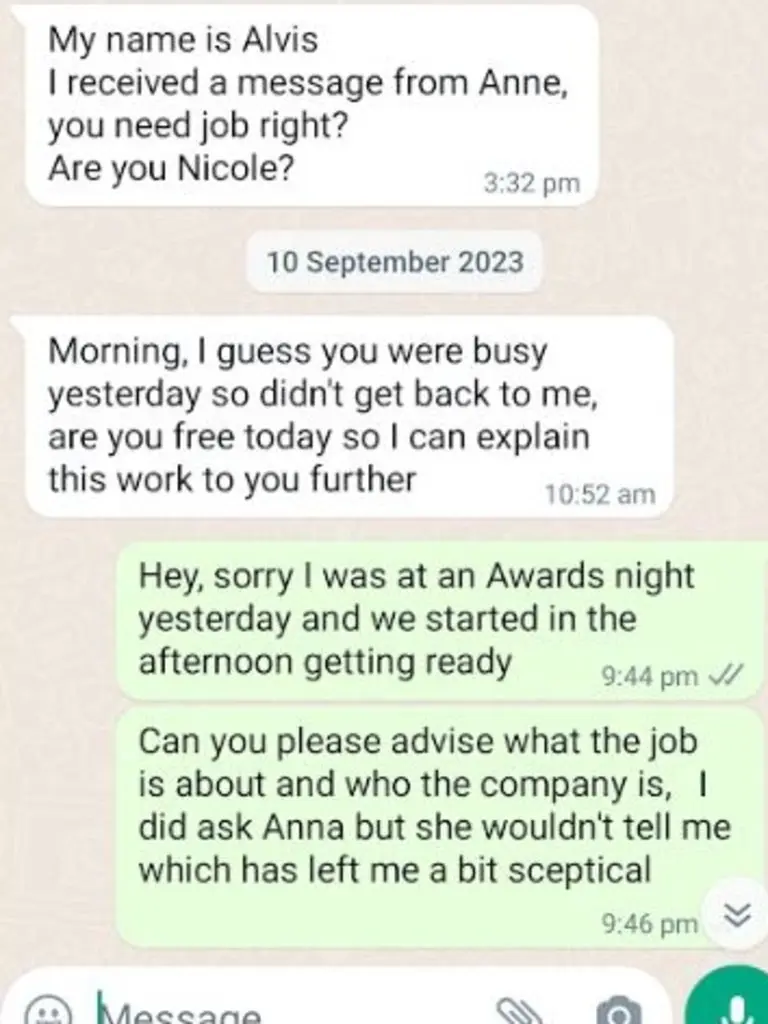
In the sunny city of Brisbane, a strong-willed mother named Nikki found herself at the center of a battle against heartless scammers. Her story is a powerful reminder that anyone can fall victim to these deceptive schemes.

At 53 years old, Nikki faced a difficult situation. She had dedicated her life to caring for her husband, who had serious medical conditions that required constant attention. To support her family and continue being there for her husband, she needed a job that would allow her to work from home.
Nikki turned to LinkedIn, a well-known employment networking site, hoping to find opportunities that matched her needs. Little did she know that her search would lead her down a dangerous path, where cunning scammers were waiting to prey on her vulnerability.
Hope arrived when Nikki received a message from a seemingly genuine man who claimed to represent a reputable marketing company called “DUNE7.” The message offered her an incredible opportunity – the chance to work from home and support her family while caring for her husband. Filled with hope, Nikki took the first step towards what she believed would be a brighter future.
The man, who identified himself as Alvis, presented Nikki with a website and documents that appeared to be from the real DUNE7 company based in New York City. Unbeknownst to her, the scammers had shamelessly copied the company’s logo and graphics to appear legitimate, a deceitful tactic that would soon unravel.
One of the co-founders of the genuine DUNE7 company confirmed that they were aware of the scam and had taken legal action to dissociate themselves from the fraudulent operation. But the investigation into this heartless scam continues.

Looking back, Nikki realized there were red flags along the way. Alvis communicated with her exclusively through messaging apps like WhatsApp and Telegram, never requesting an interview or standard hiring documentation. Instead, he guided her through a training process, promising substantial commissions for completing tasks.
The first set of tasks went smoothly, and Nikki earned $263 (US $149), providing a glimmer of hope in her difficult situation. However, as she progressed to the next level, the truth began to unravel. Alvis introduced her to “expedited journeys,” promising even higher commissions but requiring Nikki to invest her own money. It was a classic “spend money to make money” ploy, one that left Nikki spiraling into a financial abyss.
Every day, Nikki found herself trapped in a never-ending cycle, investing more and more of her dwindling savings. Desperation grew, but she felt powerless to break free. She couldn’t cut ties with Alvis, fearing that it would mean losing her hard-earned money forever.
With her life savings depleted, Nikki even took out a $6,000 (US $3,800) bank loan, hoping it would be a lifeline. But the situation only worsened. Her losses surpassed $15,000 (US $9,500), and she felt utterly lost on how to recover.
To make matters worse, Alvis’s tactics took an even darker turn as he started showing romantic interest in Nikki. She, however, remained composed and focused solely on recovering her money. The toll on her emotional well-being was immense, and her mental health suffered.
When Alvis persisted, pressuring her to invest another $10,000 (US $6,300), Nikki reached her breaking point. She decided to confide in her sister and revealed the nightmare she had been living. It was then that the harsh reality became crystal clear: Nikki had become a victim of a heartless scam.
Overwhelmed by guilt and worry, Nikki couldn’t believe how she had been duped. Her entire savings had been snatched away by heartless criminals, leaving her with nothing but regret and despair.
Nikki’s story sheds light on the increasing threat of employment scams that target vulnerable individuals, especially those in desperate situations. Scammers like Alvis exploit the promise of financial stability, using clever tactics to take advantage of those barely making ends meet.
LinkedIn, the platform that unknowingly connected Nikki with her tormentor, has acknowledged the rise of such scams and taken steps to combat them. They encourage members to stay vigilant, providing resources and guidance to identify and report suspicious job offers.
The Australian Competition & Consumer Commission (ACCC) reveals a disturbing trend: job scams have surged in the past year, with Australians collectively losing nearly $20 million (US $12.6 million) between January and September 2023 alone. The rising cost of living and the shift to remote work have made individuals more susceptible to scams, with scammers posing as reputable companies and impersonating legitimate recruitment agencies.
To protect against employment scams, SCAMWATCH offers crucial advice:
- Never send money or personal information to strangers online.
- Avoid upfront payments via bank transfer, PayID, or cryptocurrency.
- Be cautious if a job is offered without an interview or discussion of qualifications.
- Verify recruiters and businesses independently.
- Don’t rush into decisions and be skeptical of offers that seem too good to be true.
- Report scams to the platform or agency where you encountered them.
- Never accept payment or rewards to recruit others into a scheme.
- Avoid transferring money or receiving packages on behalf of others.
- Safeguard your personal information and only share it with legitimate recruitment firms.
- Regularly update online account passwords.
Nikki’s story serves as a stark reminder of the need for vigilance in the digital age. It is a call to action, urging all of us to stand together against heartless scammers and support those who have fallen victim to their deceitful schemes. Despite losing her savings, Nikki has found the strength to share her story, helping protect others from a similar fate. Her resilience and determination to rebuild her life showcase the indomitable power of the human spirit, even in the most challenging of times.






